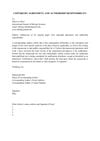3 citations,
January 2020 in “Acta veterinaria indonesiana” The cat with ringworm got better after being treated with oral and topical medications for 35 days.
 1 citations,
October 2021 in “Gene, cell and tissue”
1 citations,
October 2021 in “Gene, cell and tissue” Grape sap may help reduce hair loss and promote hair growth in rats.
 1 citations,
August 2018 in “Journal of The American Academy of Dermatology”
1 citations,
August 2018 in “Journal of The American Academy of Dermatology” Combination of minoxidil and finasteride is more effective in increasing hair diameter than minoxidil alone for female-pattern hair loss.
 1 citations,
May 2014 in “European Journal of Inflammation”
1 citations,
May 2014 in “European Journal of Inflammation” A lotion with minoxidil, hydrocortisone butyrate, and 17a-estradiol can improve or stabilize Frontal Fibrosing Alopecia in some cases, but there's no universally-accepted treatment yet.
1 citations,
January 2014 The emulgel formulation F6 released more Minoxidil than the gel formulation F1.

Combining stress management and Minoxidil helps treat stress-related hair loss and improve well-being.
 December 2024 in “Asian Journal of Pharmaceutical and Clinical Research”
December 2024 in “Asian Journal of Pharmaceutical and Clinical Research” Adding PRP to minoxidil and finasteride is more effective for hair loss.
 December 2024 in “Journal of Medicinal Chemistry”
December 2024 in “Journal of Medicinal Chemistry” A new topical treatment for hair loss shows promise by targeting androgen receptors.
 October 2024 in “Journal of Drugs in Dermatology”
October 2024 in “Journal of Drugs in Dermatology” Combining finasteride with minoxidil is more effective for male hair loss than using minoxidil alone.
May 2024 in “International journal of molecular sciences” Melatonin cream may help prevent skin damage but its anti-aging and hair growth effects are unclear.
 May 2024 in “Chemical engineering journal”
May 2024 in “Chemical engineering journal” New treatment using Minoxidil and EGCG with ionic liquids improves hair growth and quality for hair loss.
 January 2024 in “International Journal of Dermatology Research”
January 2024 in “International Journal of Dermatology Research” Minoxidil alone is as effective as the combination but has fewer side effects.
 December 2023 in “International journal of research in dermatology”
December 2023 in “International journal of research in dermatology” Adding PRP to topical mometasone improves and speeds up alopecia areata treatment.
 December 2023 in “Siriraj Medical Journal”
December 2023 in “Siriraj Medical Journal” 5% Azelaic acid is as effective as 2% Minoxidil for female pattern hair loss and could be an alternative for those allergic to Minoxidil or pregnant.
 November 2023 in “PubMed”
November 2023 in “PubMed” Naringenin and its combination with minoxidil significantly improved hair growth in mice.

The new skin cream with zinc oxide nanoparticles is stable, spreads well, and doesn't deeply penetrate the skin.
 August 2023 in “Faculty Opinions – Post-Publication Peer Review of the Biomedical Literature”
August 2023 in “Faculty Opinions – Post-Publication Peer Review of the Biomedical Literature” Minoxidil users may experience hair discoloration, especially with long-term use and a family history of gray hair.
 July 2023 in “Research Square (Research Square)”
July 2023 in “Research Square (Research Square)” Using Cetirizine 1% cream daily can significantly improve hair growth and thickness in men with hair loss, and it's safe to use.

Redensyl, saw palmetto, and biotin with platelet-rich plasma is a better treatment for hair loss than Procapil with platelet-rich plasma.

Some TikTok hair loss remedies like rosemary oil, onion juice, and garlic gel show promise, but more research is needed and they might delay proper treatment.
 July 2020 in “International journal of biology sciences”
July 2020 in “International journal of biology sciences” Coconut oil mixed with egg yolk and vitamin E may improve rabbit hair growth more than other plant oils.
 August 2019 in “Journal of The American Academy of Dermatology”
August 2019 in “Journal of The American Academy of Dermatology” 5% minoxidil foam effectively regrows hair in women, with postmenopausal women seeing the most improvement.
 April 2017 in “Journal of Investigative Dermatology”
April 2017 in “Journal of Investigative Dermatology” SIG-1451 could be a promising new treatment for atopic dermatitis.
January 2016 in “Hair therapy & transplantation” Hair UpTM effectively and safely promotes hair regrowth, especially in minors.
 December 2015 in “Dermatologic Therapy”
December 2015 in “Dermatologic Therapy” Zinc sulfate solution is more effective than tea lotion for treating acne rosacea.
August 2015 in “Europe PMC (PubMed Central)”  October 2014 in “Cancer Research”
October 2014 in “Cancer Research” A new topical treatment may prevent hair loss from cancer therapy by adjusting cell death processes in hair follicles.
 March 2005 in “Journal of the American Academy of Dermatology”
March 2005 in “Journal of the American Academy of Dermatology” Bexarotene 1% topical gel helped some patients with alopecia areata regrow hair.
 January 2004 in “Side effects of drugs annual”
January 2004 in “Side effects of drugs annual” Certain skin drugs and topical agents, including some natural extracts and fragrances, can cause allergic reactions. Some hair dyes and extensions, as well as minoxidil, a hair growth treatment, can also cause allergies. Botulinum toxin A can effectively reduce sweat but may have temporary side effects.
 September 1998 in “Journal of the European Academy of Dermatology and Venereology”
September 1998 in “Journal of the European Academy of Dermatology and Venereology” Autoimmune and inflammatory processes are involved in both scarring and non-scarring types of hair loss.
























